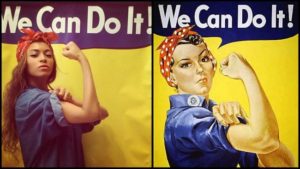
Doris Meier
Earlier this month, I had the unique opportunity to attend a two-day summit on gender equality issues for women working in STEM (science, technology, engineering and mathematics). The presenters were women in prominent leadership positions at GE, Coca-Cola, Google, LinkedIn and Pixar, government agencies such as the U.S. Navy and NASA as well as some impressive women-owned start-up companies. Â
Presentation topics ranged from global gender and wage inequality, lack of diversity, female executive leadership challenges, unconscious bias, and helping young women succeed in STEM.Â
I learned about the tremendous amount of work that still needs to be done to promote gender equality in the work place. There was significant consensus among presenters that men need to be invited to the conversation and educated about gender inequality because the negative consequences affect them just as much as women. Presenters talked about how it is every woman’s responsibility to raise awareness and fight for equal rights no matter how small or big the contribution.  My biggest take-away was that women need to be more aware of their self-worth and tendency toward self-deprecation (e.g. often apologizing when not called for), instead of selling ourselves short and adapting to the male style, we should be celebrating our uniquely female traits, talk about our accomplishments more often and speak up at every opportunity.
 Here are some important facts about gender equality in the workplace:
Here are some important facts about gender equality in the workplace:
– Men apply for jobs when they meet 60% of qualifications, while women usually only apply when they meet 100%.
– During job interviews men focus on their strengths, accomplishments and potential for learning whereas women focus more on their weaknesses and shortcomings.
– Women don’t speak up as often and don’t sound as confident as men do
– Finding meaningful work that has a positive social impact is more important for women than men; men are more focused on furthering their own careers.
– Men are hired based on potential, women based on accomplishments.
– There has been no improvement in hiring practices overall despite diversity training and awareness efforts.
– When under stress women release a much higher level of oxytocin than men, which explains why women tend to feel the need to bond and nurture whereas men withdraw and become more aggressive. (More detailed info here)
– Both female and male perspectives are necessary in the workforce as they represent the population’s interests and needs equally.
– Companies with a higher female representation and more women in leadership are more profitable.
 Snippets of the presentations with more important information for women in the workplace:
Snippets of the presentations with more important information for women in the workplace:
- The VP of global scientific affairs at Coca Cola urged women to sell themselves better, talk about their accomplishments with colleagues, supervisors, family and friends. She also recommends selling your distinct female advantages, which include being able to lead from the front and from behind, having more empathy and having a unique female perspective.
- A product data scientist at Hired.com revealed that their data confirms that women undersell themselves as far as salary requests goes which often keeps them in a lower salary category throughout their careers.
- The Deputy Chief Scientist at NASA pointed out a specific case where a man was hired despite being much less qualified for a high level job than a woman because the man showed confidence and a can do, positive attitude during the interview whereas the woman focused too much on her shortcomings.
- The president at the San Francisco Chapter for UN Women is convinced that gender inequality has not been made a big enough issue worldwide and that woman are not asking for enough in general. She referenced the successful marriage equality movement and how the LGBT community would not be quiet until they got equal rights. She urges women in the workforce to do the same and not rest until equal treatment and pay is achieved.
- The black female founder of a hiring app (Blendoor.com), which takes the bias out of the hiring process by eliminating names and gender identification, pointed out  the rampant lack of interest of venture capitalists in investing in black women owned startups. She also mentioned a study that suggests a white male’s name on a resume is worth 8 years of experience.
Originally from Switzerland and now residing in San Francisco, Doris Meier is a freelance photographer, frequent traveler, part-time life coach, and also works as an independent project manager contractor for socially conscious organizations.


